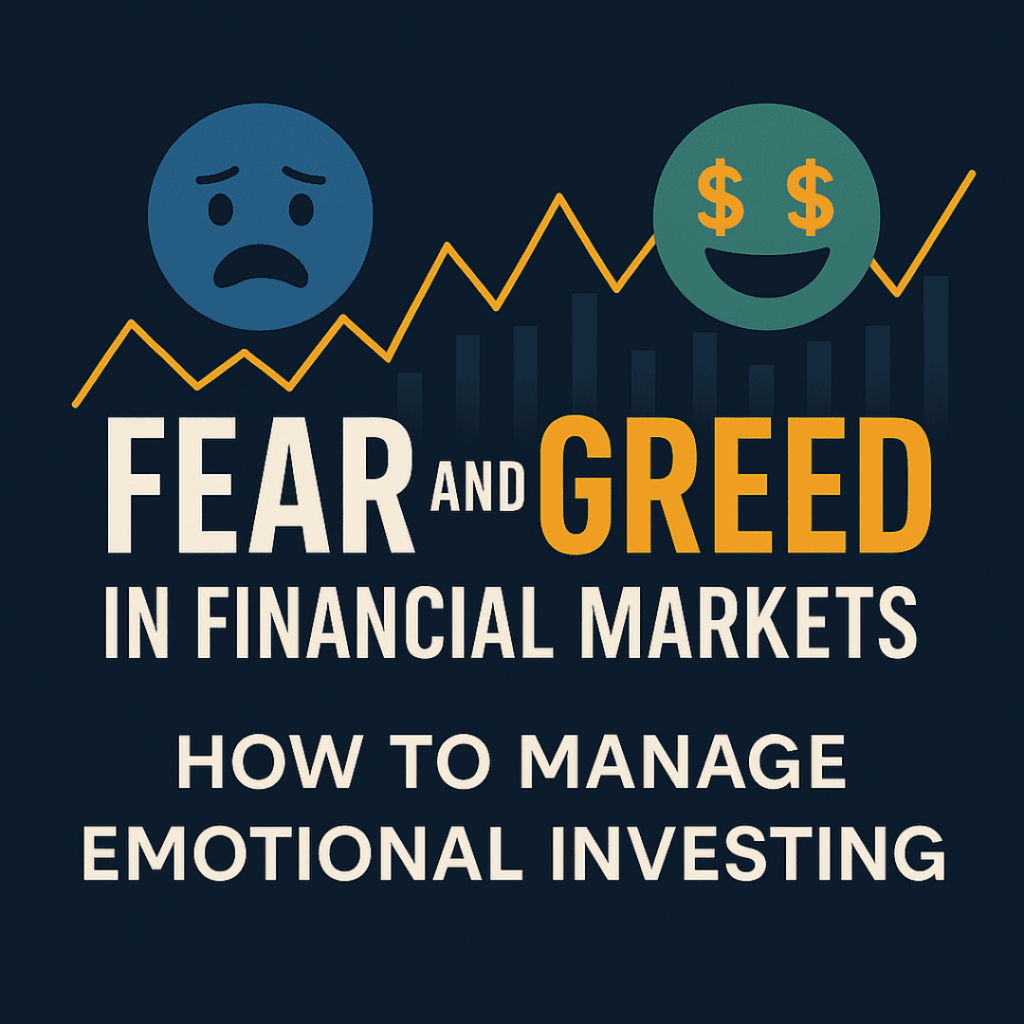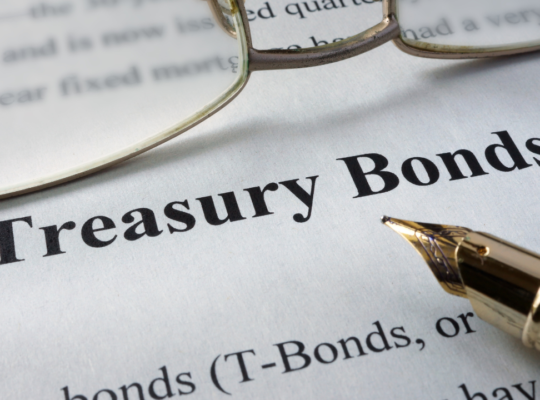
In the world of investing, emotions can play a major role in shaping decisions and outcomes. A famous saying by Warren Buffett captures this idea well: “Be fearful when others are greedy, and greedy when others are fearful.” This wisdom highlights the importance of understanding and managing our feelings when investing. Although it sounds straightforward, applying it in real life is challenging.
Investors often get swept up in the excitement of rising markets and become anxious when prices drop. In this blogpost, we will explore the roots of fear and greed in financial markets, how they manifest, ways to measure them, and strategies to keep them under control.
Table of Contents
The Role of Emotions in Investing
Investing is not just about numbers and trends; it is deeply influenced by human emotions. When markets are booming, many investors feel an irresistible pull to invest more, hoping to capture high returns. On the flip side, during market downturns, a wave of panic can force investors to sell their holdings quickly to avoid further losses. This emotional tug-of-war between fear and greed often determines market trends and volatility.
Understanding Market Fear
When investors talk about fear in financial markets, they usually refer to a collective worry about losing money. Fear can be seen when the market outlook appears gloomy, and investors begin to expect a decline in asset prices. There are several signs of market fear:
- Widespread Panic: Investors start selling off their stocks or other investments quickly. This mass sell-off is often driven by the anxiety of potentially losing money.
- Increased Volatility: Markets become unpredictable and experience sharp fluctuations in prices. This instability is a direct result of nervous trading, where investors are more reactive to news and rumours.
- Loss Aversion: At its core, fear is driven by the desire to avoid losses. Investors become so focused on not losing money that they make decisions based on short-term market movements rather than long-term fundamentals.
For example, if news of a potential banking crisis or changes in government policies emerges, many investors may rush to sell their assets to avoid further losses. This can lead to a rapid decline in market prices, creating a self-reinforcing cycle of fear. Furthermore, some experienced investors might take advantage of this situation by betting against stocks (a process known as short selling), which can worsen the downward spiral.
Recognizing Market Greed
On the other end of the spectrum is greed. Greed in financial markets is often characterized by an excessive desire to gain profits, sometimes leading investors to overlook risks. Greedy behavior typically shows up during periods of sustained market gains. Here are some of its key characteristics:
- Overconfidence: When markets are performing well, investors often start to believe that they have a special insight or skill. They attribute the good returns to their own clever strategies rather than understanding that market forces can be unpredictable.
- Fear of Missing Out (FOMO): Many investors worry that if they don’t jump in, they might miss the opportunity for large gains. This feeling pushes them to buy assets even when prices are high, hoping that the upward trend will continue indefinitely.
- Herd Mentality: Instead of making decisions based on their own research, some investors simply follow the crowd. When everyone else is buying, they join in without carefully considering whether the investments are truly sound.
- Ignoring Warning Signs: Greed can cause investors to pay less attention to red flags. They might selectively gather information that confirms their bullish view while dismissing any news that hints at a potential downturn.
This behaviour often leads to overvalued markets where asset prices are driven by optimism rather than solid fundamentals. As more people join in the rally, the prices climb higher, sometimes reaching levels that are not justified by the actual performance of companies or the economy. In these situations, a slight negative trigger can suddenly reverse the trend, leading to a steep correction or even a market crash.
Measuring Emotions in the Market: The Role of Volatility

One of the most common ways to gauge the mood of the market is by measuring volatility. A popular tool for this purpose in the Indian market is the India VIX, often known as the “fear gauge.” The India VIX is an index that reflects how much investors expect prices to fluctuate over the next month. Here’s how it works and what it tells us:
- Forward-Looking indicator: Unlike measures that look at past price movements, the India VIX uses the current prices of options on major indices to predict future volatility. It tells us what traders believe the market will do in the coming days and weeks.
- Risk and Uncertainty: When the India VIX is high, it suggests that investors expect significant price swings, which indicates nervousness and uncertainty. This situation is usually associated with increased fear among market participants.
- Real-Time updates: The index is updated continuously during trading hours. This means that as new information becomes available, whether it’s economic data, political news, or global events, the India VIX can quickly reflect changes in investor sentiment.
- Guidance for Investors: Many traders and portfolio managers use the India VIX to adjust their strategies. A rising index may prompt them to reduce risk by holding more cash or hedging their positions, while a falling index might encourage them to invest more aggressively.
The concept behind the India VIX is relatively simple: the more fear there is, the higher the expected volatility. Conversely, when the market is calm and investors are not worried, the index tends to be lower. This relationship makes the India VIX a valuable tool for understanding the overall mood of the market.
Practical ways to manage Fear
Dealing with fear in investing is crucial for long-term success. One of the simplest pieces of advice is: “Don’t panic!” However, putting this advice into practice requires discipline and a clear understanding of market dynamics. Here are some strategies to help manage fear:
- Accept the natural ups and downs: Financial markets are inherently volatile. It is normal for asset prices to rise and fall over time. By accepting that downturns are a natural part of the market cycle, you can avoid making hasty decisions based on short-term movements.
- Keep a level head during Crisis: When the market takes a hit, try to remain calm. Emotional reactions can lead to selling at the worst possible moment. Instead, consider the long-term outlook and remind yourself that markets have a history of bouncing back even after severe downturns.
- Have a reserve of Cash: Maintaining some cash on the side can be a prudent strategy. This reserve not only provides a safety net during turbulent times but also gives you the flexibility to seize opportunities when prices are low. However, it is important that any decision to invest during a downturn is backed by sound analysis, rather than simply trying to take advantage of panic.
- Educate yourself: Understanding the fundamentals of investing and the reasons behind market movements can help reduce fear. The more you know about why prices fluctuate and the historical patterns of recovery, the less likely you are to be swayed by momentary panic.
Keeping Greed in Check
Just as important as managing fear is the need to prevent greed from taking over. Overconfidence and the urge to chase high returns can lead to risky decisions that may not pay off in the long run. Here are some tips for keeping greed under control:
- Set clear profit targets: Before entering an investment, decide on a target profit level. This will help you know when it might be a good time to take some gains off the table. By having a plan in place, you can avoid the temptation to hold on for too long, hoping for even bigger gains.
- Diversify your investments: Instead of putting all your money into one asset, spread your investments across different types of assets. Diversification can help protect your portfolio from significant losses if one sector experiences a downturn.
- Review your decisions regularly: Periodically re-evaluate your investment choices. If an asset’s price has risen substantially, take a moment to consider whether it still makes sense to hold on to it. Sometimes, a portion of your profits can be taken out to secure your initial investment, while the remaining funds continue to work for you.
- Avoid the Herd Mentality: It can be tempting to follow the crowd when a particular stock or asset seems to be performing well. However, independent analysis is key. Just because everyone else is buying does not necessarily mean that the investment is a good one. Do your research and trust your judgment.
- Focus on the Fundamentals: Greed often leads investors to rely too heavily on market sentiment rather than on the underlying value of an investment. Always take time to assess the actual performance, prospects, and risks associated with an asset. This approach helps ensure that your decisions are based on solid reasoning rather than on the excitement of the moment.
Balancing Emotions with Strategy

Both fear and greed are natural responses to the ups and downs of the financial markets. However, successful investors learn to balance these emotions with a clear, strategic approach. Here are a few more ideas on how to maintain that balance:
- Develop a Long-Term Plan: Instead of reacting to every market fluctuation, focus on your long-term financial goals. A well-thought-out investment plan that takes into account your risk tolerance, time horizon, and financial objectives can provide a stable foundation during times of market turbulence.
- Stick to your Strategy: Once you have a plan in place, it is important to follow it, even when market conditions are volatile. This discipline can help prevent emotional decisions that might derail your long-term progress.
- Seek Professional Advice: If managing your emotions and investments becomes overwhelming, consider working with a financial advisor. A professional can offer objective advice and help you stay focused on your overall goals, especially during periods of market stress.
- Learn from the past: History has shown that markets are resilient. Even after periods of severe decline, there has always been a recovery. Keeping this perspective in mind can help temper the immediate fear or greed that might arise during short-term market movements.
Final Thoughts
Emotions such as fear and greed are powerful forces that can significantly influence investment decisions. When markets are performing well, the risk of being swept up in overconfidence is high, and during downturns, the urge to panic can lead to hurried and unwise decisions. By understanding the underlying causes of these emotions and recognizing the signs when they start to dominate, investors can take steps to manage their behaviour more effectively.
Using tools like the India VIX can provide valuable insight into market sentiment, offering a glimpse into how much uncertainty or confidence exists among investors. Yet, while these indicators are useful, they are not a substitute for a well-rounded strategy that includes thorough research, disciplined planning, and regular review of your investment portfolio.
The journey of investing is as much about understanding human behaviour as it is about analysing numbers. In the end, the goal is to make decisions that are driven by logic and careful analysis rather than by the fluctuations of emotion.
Check out my other article on the behavioural bias that investors encounter while investing.
Do Follow me on Linkedin and Quora for more informative posts on personal finance, investments, money management, debt management, and much more.





